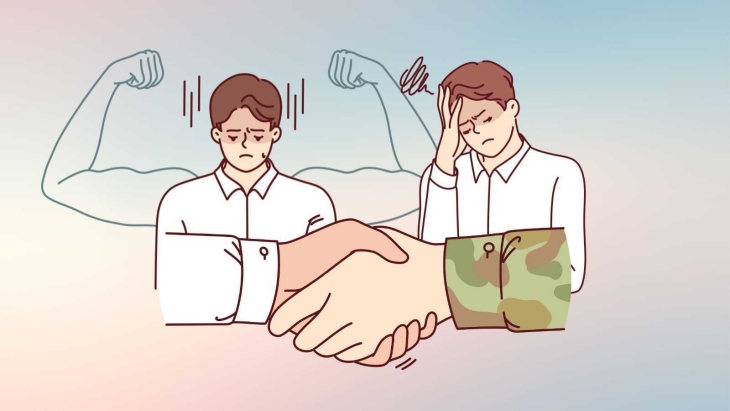Recent Posts
- Am I too sensitive to noise? It drives me crazy! The psychological effects of noise on mental health
- What are the signs that I am avoiding grief? How avoiding processing loss impacts mental health
- My son's disruptive behavior is affecting his life. How can I help him improve?
- I want to be ready for motherhood: Exploring pre- and postnatal mental health issues
- Effects of positivity on job search motivation. How do I stay confident when my job search gets tough?
Most Popular
I am hesitating on joining the armed forces! Are people in the armed forces more prone to mental health problems?

Being away from loved ones and the community for several months at a time, facing negative attitudes and beliefs about seeking mental health support, being periodically relocated are some of the many life stressors associated with military life.
A report from the Defense Department looking into military officers’ mental health between 2015 and 2020 showed that there has been a 40% rise in suicide rate in the military. In fact, just in the year 2020, a 15% spike was seen.
Mental Health risk factors in military life
In a study done by the Cost of War project in 2021, stress factors that are unique to military life put them at risk for life-changing trauma mentally, physically, morally, and even sexually. Factors like stress and burnout also play a major role.
- Exposure to stressful and traumatic scenarios,
- Living away from family and friends for long stretches of time,
- Being physically injured from combat,
- Periodic relocation,
- Seeking mental health help being stigmatized,
- Intense training and physical preparation,
- Legal-related issues,
- Unhealthy sleep patterns,
- Abuse of addictive substances, and
- Loneliness or isolation.
Aside from these factors that soldiers experience while actively serving in the military, they also have trouble going back to civilian life. This is usually true when one has been in the military for a long period.
There is higher risk of having:
- Family problems,
- Social connection problems, and
- Concerns about quality of life ( affected by finances, housing, and healthcare access).
The effects of these factors can affect the mental wellbeing of military people while on active duty and even years after their service.
The army and mental health
In a 2022 report by the Defense Centers for Public Health, the mental health issues commonly found in the armed forces are behavioral health disorders. There are high cases of:
- Anxiety,
- Depression,
- Adjustment disorders,
- Post traumatic stress disorder (PTSD,
- Other mood disorders, and
- Substance use disorders.
Promoting mental well-being in the armed forces
Just as physical fitness is fundamental in a strong military force, the mental wellness and wellbeing of soldiers all throughout their lifespan is integral in the peak performance of a country’s defense system.
The approach to making soldiers ready to do their job must also include mental health awareness and promotion of mental wellbeing.
One of these training programs include the Holistic Health and Fitness Program that provides an emphasis on taking care of both mind and body.
Despite the prevailing stigma on mental health issues, there is a rising call for military personnel to make use of mental health services and resources.
In 2018, a US soldier’s death by suicide prompted US military to pass the Brandon Act that encourages soldiers to seek mental health help by:
- Asking for a mental health assistance through one’s military commander or supervisor,
- Making mental health concerns and asking of help confidential,
- Reducing the stigma on mental health issues.
Being in the armed forces is both a privilege and an honor. But the reality is that this work demands a lot from one’s mental health and wellbeing, so prioritizing one’s psychological health will increase the chances of a resilient and healthy armed forces.
Many career opportunities are waiting for qualified talents in the medical and mental health field! Find them now and connect with clients looking for top talent.








Comments